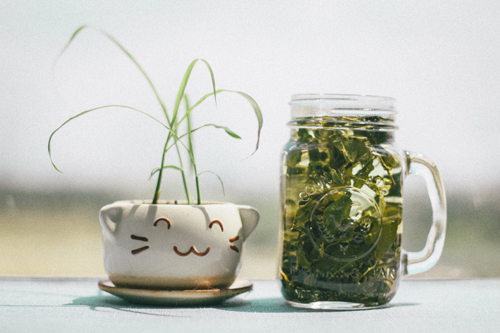Herbal extracts are made from herbs and alcohol. Alcohol has the effect of removing essential oils from the plant material and releasing them into a liquid solution. Essential oils are the substances that give herbs their characteristic aroma and flavor. Extracts are used in the kitchen for flavoring foods and beverages.
Vanilla extract is probably the most commonly used extract. It’s part of countless desserts and baked goods, as well as a flavoring for hot and cold beverages. Lemon extract, orange extract and almond extract are a few other commercial extracts used in cooking and baking. Extract flavors are very concentrated, so only teaspoon amounts are required for most recipes.
In preparing these commercial extracts ethyl alcohol, or ethanol, is used to take out “the essence” from the source material, like vanilla beans, lemons, oranges or almonds, and release the essential oils into a liquid solution, called the alcohol extract. The alcohol extract is a solution of the essential oils and alcohol. Most commercial products are diluted to about 35% alcohol, but quite concentrated in flavor. Alcoholic extracts may also be called tinctures, but that is term used primarily with herbal extracts used in herbalism and aromatherapy.
It’s easy to make your own herbal extracts in your own kitchen. All you need is the plant material, some high-proof, non-flavored vodka or straight ethanol, and a jar with a tight-fitting lid. Pint-sized mason jars work well for small quantities.
Herb Garden Plants – Top 10 “Must Haves” When Growing Kitchen Herbs
Chop the herbs finely and place in mason jar. Fresh herbs will work the best, but dried will suffice. Don’t use powdered herbs as they will be hard to strain out of the resulting liquid. Pour the vodka over the herbs to cover them and seal the jar. Shake the jar to mix the contents and place it in a dark cupboard. Leave the jar in the dark for a month or more, shaking the contents every few days. Dried herbs will soak up some alcohol, so you might have to add a little more alcohol in the first couple days to make sure the plant material is totally covered with the vodka.
After the month of soaking open the jar and strain the contents through cheesecloth into a clean container. When the liquid has completely filtered through the herbs, wring the cheesecloth to squeeze out the last drops of the extract. Pour the extract into small jars using a funnel. Seal the jars with tight-fitting lids and store them in a dark cupboard. The shelf life of these herbal extracts is three to five years, so share them and enjoy.
The Author:
Naomi Gallagher is a writer and a fantastic cook. Learn more about using culinary herbs by visiting use that herb, where Naomi serves up a number of articles about culinary, medicinal and crafty herbs.
Photo. Tranmautritam
